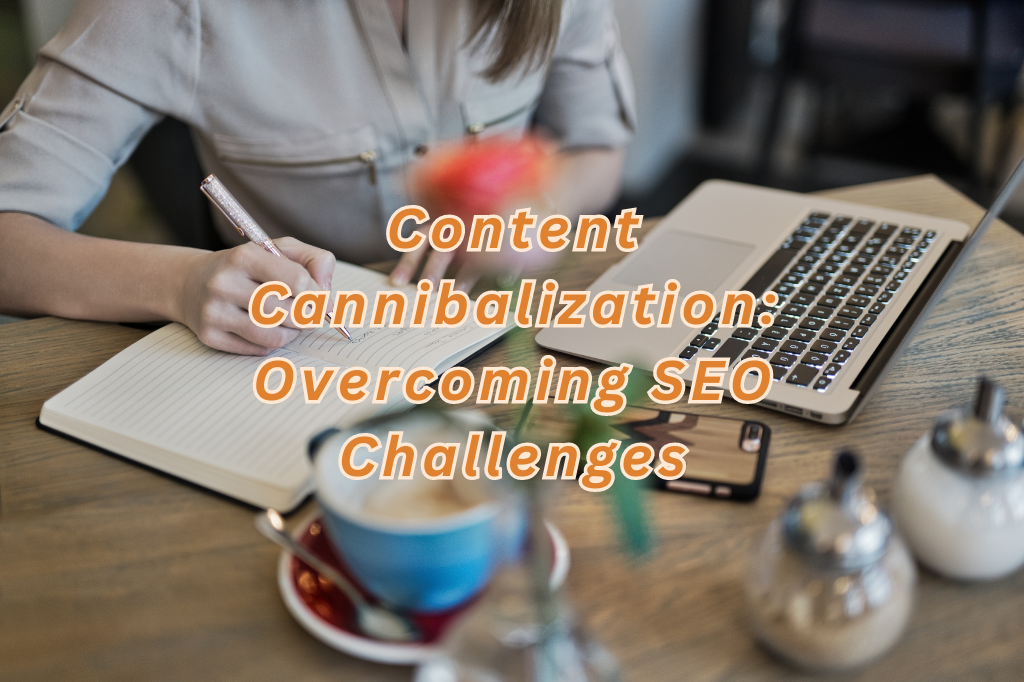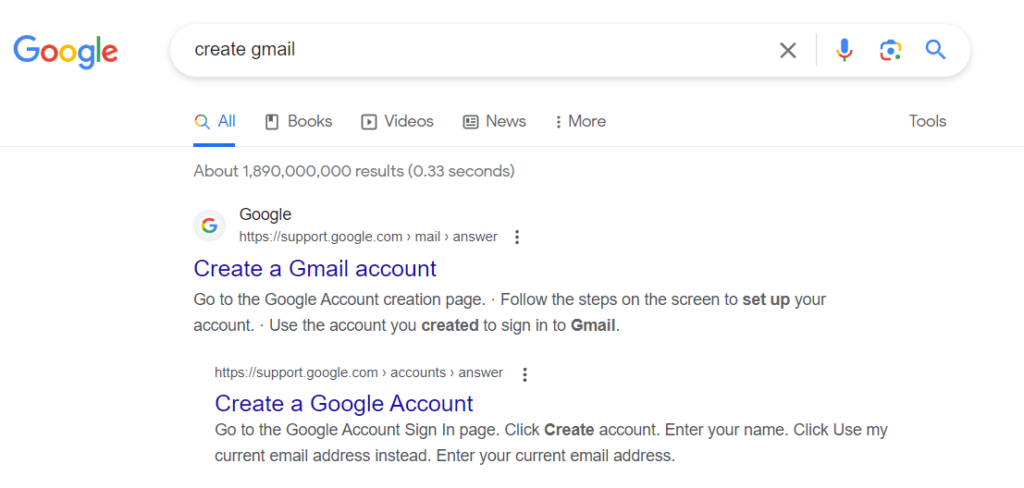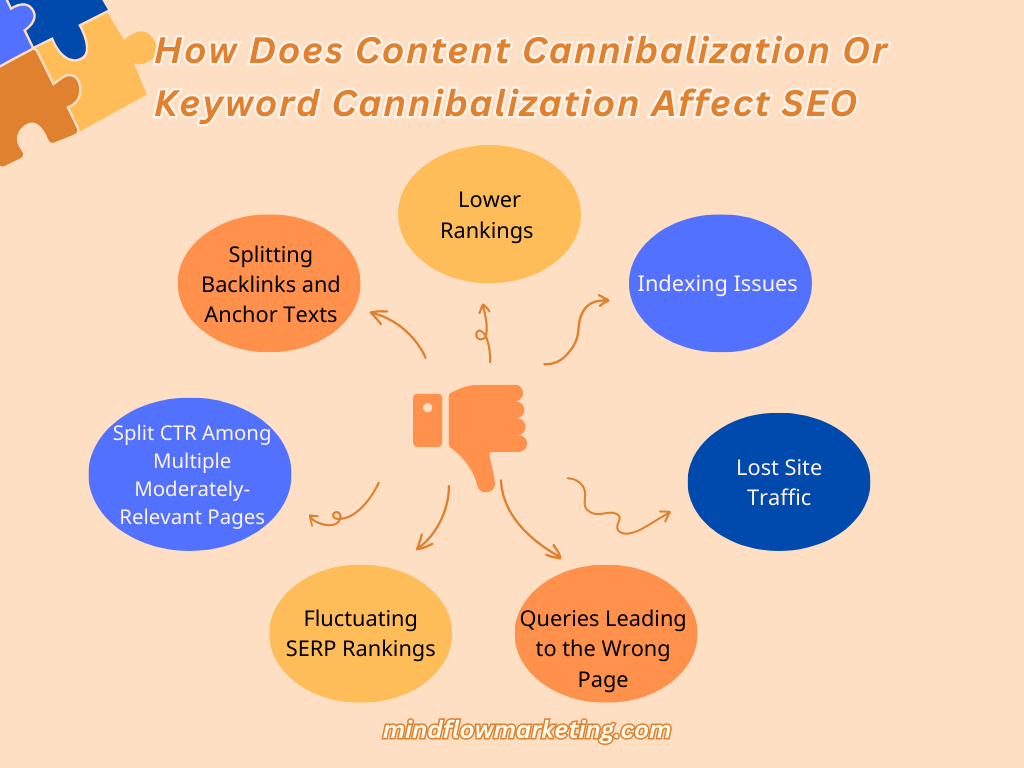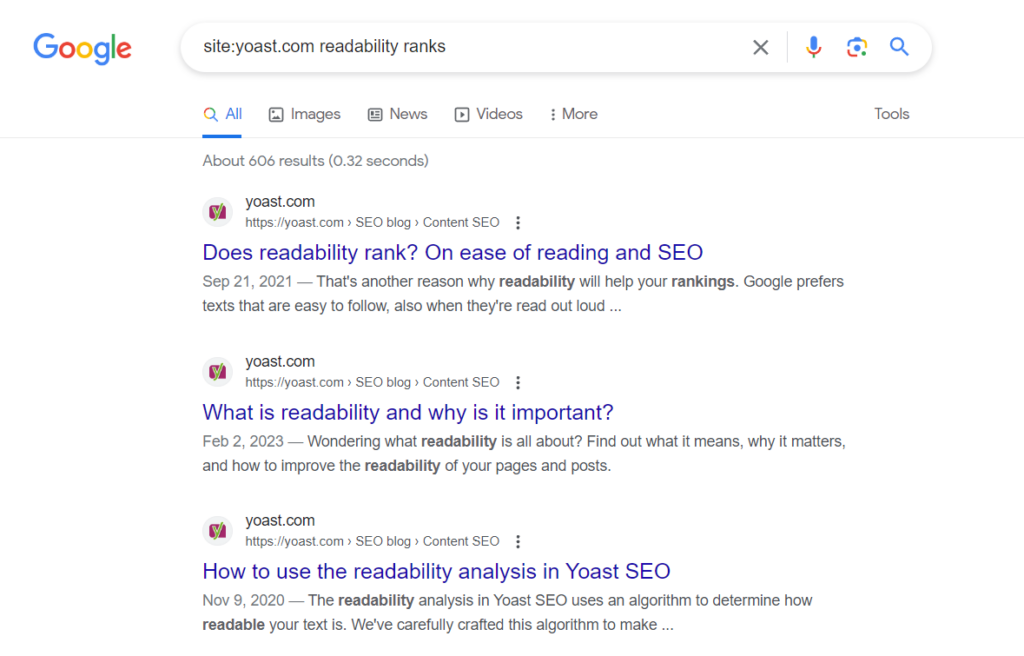Content cannibalization is a prevalent issue faced by content marketers and website owners. It occurs when multiple pages on your website target the same keywords, leading to confusion for search engines and potential loss of traffic.
In this blog post, we’ll explore the impact of content cannibalization on SEO and provide strategies to help you identify and address any issues.

What is Content Cannibalization?
Keyword cannibalization occurs when multiple blog posts or articles on your site can rank in Google for the same search query. Because they are too similar in the topic or because you optimized them for the same key phrase.
When you optimize posts or articles for similar search queries, they reduce each other’s chances of ranking. In most cases, Google will only show one or two results from the same domain in the search results for a given query. You might get 3 if you have a high authority domain.
What Are Examples of Keyword Cannibalization?
Assume that I am new to digital marketing and would like to learn more about link building. So I Googled “create gmail” and got the following results:

At the top of the search results, I find two posts from the same website that cover nearly the same topic. Which should I choose?
This needs to be clarified for readers and search engine algorithms, making it difficult for your content to rank and capture the audience’s attention.
How Does Content Cannibalization Or Keyword Cannibalization Affect SEO ?

Content cannibalization is creating multiple pieces of content with similar or identical topics, titles, and keywords. This can have a negative effect on SEO rankings as search engines prioritize unique content over duplicate content.
Lower Rankings
Regarding ranking websites in organic search results, search engine algorithms favor originality and uniqueness. Duplicate or near-duplicate content needs to be clarified for the algorithm, which leads to lower rankings for all involved pages due to the dilution of keyword relevance and authority signals.
Additionally, only one page will rank well if two pages compete for the same keyword phrase. At the same time, the other will be pushed down into obscurity due to the lack of relevance signals from backlinks and social shares that both pages should receive when they’re different enough from each other.
Indexing Issues
Another factor contributing to decreased SEO performance is indexing issues caused by duplicate URLs on a website containing identical or similar content. This must be clarified for crawlers when attempting to access new information about your site structure.
If there are fewer duplicated URLs within a domain, then some may not get indexed, which means no visibility in SERPs (Search Engine Results Pages).
Lost Site Traffic
Keyword cannibalization can lead to lost site traffic due to your page competing with itself for rankings on search engine result pages (SERPs). This means you are splitting up the clicks and impressions between multiple pages instead of having one authoritative page ranking higher and converting better, resulting in fewer visitors visiting your website or blog post from a single query or keyword search.
Queries Leading to the Wrong Page
Having multiple pages targeting similar keywords can also lead to queries being directed towards the wrong pages, which may not have all the relevant information needed by readers looking for an answer, leading them away from your website before they find what they need or, worse still leading them away with incomplete information leaving them unsatisfied with their experience on your website blog post.
Fluctuating SERP Rankings
Another issue caused by keyword cannibalization is fluctuating SERP rankings as Google’s algorithm will be trying to determine which of these pages should rank higher based on relevance, authority, etc., meaning that it’s difficult to maintain consistent rankings over time when there are multiple versions of a page targeting similar keywords available online at once.
Split CTR Among Multiple Moderately-Relevant Pages
Instead of having one highly authoritative page, you’re splitting up your click-through rate (CTR) among multiple moderately-relevant webpages – essentially turning those web pages into competitors fighting for attention rather than consolidating views onto one single source of information about a topic, thus reducing its overall impact on readers seeking answers about a particular subject matter related to content marketing, increasing their online presence or building followers around their brand niche.
Splitting Backlinks and Anchor Texts
By having multiple versions of the same webpage online, you are also splitting backlinks and anchor texts, which could have made one consolidated source more authoritative than if split amongst two different sources.
This reduces visibility and organic reach since potential customers will only see how much expertise lies within any article because it is spread across two separate web pages instead.
How To Recognize It?
It is simple to determine whether your site suffers from keyword cannibalism. You simply conduct a search for your site for any specific keyword that you suspect may yield multiple results. In my case, I’ll look up site:yoast.com readability rankings. The first two results are the articles I suspected of cannibalization.

‘site:domain.com’ in Google “keyword” will tell whether you suffer from keyword cannibalism. You can double-check your findings by typing the same keyword into Google (using a private browser or a local search result checker like https://valentin.app/).
Which of your pages do you see in the search results, and where do they rank? Of course, if two of your pages rank #1 and #2 for the same keyword, that’s not a problem. But do you see your articles, for example, on positions 7 and 8? Then it’s time to sort things out!
Strategies for Avoiding Content Cannibalization
Content cannibalization occurs when a website has multiple pages that cover the same topic. This can cause problems with SEO because search engines need to know which page to prioritize and will often index both, resulting in decreased visibility for both pages.
To avoid this problem, content marketers should focus on creating unique content across their sites.
Breaking Out the 301s or New Landing Pages
If you’re struggling with keyword cannibalization, one of the simplest solutions is to take your most authoritative page and turn it into a landing page that links to other unique variations falling under your targeted keywords.
For example, if you have multiple pages targeting “shoes” as a keyword, make this your canonical source page and link all more specific variations back to it using 301 redirects or new landing pages.
Creating a Unique Landing Page
In cases where you don’t have an authoritative source page yet, consider creating one as a consolidation point for all of your product pages in one place – such as “hiking shoes” and “sneakers for men.”
This will allow you to target both broad keywords on your consolidated pages while ranking for long-tail keywords on each variation’s page.
Combining Underperforming Pages
Sometimes two similar but separate pages can be combined into one more powerful authority hub – particularly when dealing with thin content issues or low traffic conversion rates from both sources.
Start by looking at analytics data from each page (traffic, bounce rate, time on page, etc.), then decide which elements are worth combining to create an even better user experience than either could provide alone.
Optimize Different Pages
One of the best ways to prevent keyword cannibalization is to hone your targeted keyword strategy so there’s no competition and problematic overlap. This means optimizing different pages to target different keywords and search queries.
Instead of having five pages competing for the same query, “SEO tips,” you can optimize each page for a similar but separate query like “digital marketing strategy,” “marketing techniques,” or “SEO for beginners.”
Use Keyword Research Tools
You need more than just a keyword strategy; you need tools that will help you track their performance over time. Free tools like Google Analytics and Ubersuggest are great options if you’re on a budget. In contrast, more advanced paid tools such as SEMrush, Ahrefs, and Moz SEO monitor offer more in-depth analytics tracking capabilities.
Use these tools to identify which keywords rank well or need improvement due to potential cannibalization issues.
Tips To Avoid Content Cannibalization
Use Keyword Research Tools
Explore what is available online when brainstorming for fresh blog posts or webpages. Use keyword research tools such as Google Keyword Planner or Moz’s Keyword Explorer to see what related terms people are searching for, and make sure your content covers something unique that has yet to be covered.
Use Internal Linking
Additionally, use internal linking strategies so that each page of your website links back to other relevant pages instead of competing against itself in the SERPs (search engine results pages).
Utilize Different Mediums
For a distinctive touch, try utilizing different mediums such as infographics, videos, or podcasts in addition to conventional text-based pieces. Consider producing an infographic or video to encapsulate the primary ideas from your article – this will offer valuable data about the subject while staying fresh and interesting.
To ensure your content is SEO friendly, incorporate keywords into your content naturally and avoid overusing exclamation points.
Vary Your Keywords
Vary your keywords to guarantee that each piece of content stands out in quality and pertinence. This will help boost visibility for all pieces involved, rather than just one at the expense of another’s ranking potential.
Monitor Websites Performance
Monitoring how well your website performs organically is also important; use analytics tools such as Google Analytics or Search Console data reports to regularly check how many visits individual pages receive from organic sources versus paid advertising campaigns.
Periodically reviewing analytics can provide an understanding of which content yields higher results, allowing for appropriate changes (e.g., interlinking related material). Doing these checks periodically can help prevent any issues caused by duplicate/overlapping content indexing by search engines before they become too big a problem.
Tools for Detecting and Resolving Content Cannibalization
Create A Spreadsheet
The first step in identifying keyword cannibalization is creating a spreadsheet with all your site’s important URLs and associated keywords. This will help you quickly spot duplicate entries across core pages that could indicate keyword cannibalization.
Additionally, if you use a rank-tracking tool, this may be an opportunity for thin content and misapplied keywords on the wrong pages, so double-check those as well.
Checking for Duplicate Entries
Once your spreadsheet is ready, check each URL against its corresponding keywords; if there are any duplicates, your website will likely suffer keyword cannibalization.
To fix this issue, make sure that each page targets different phrases or topics rather than focusing on one single term throughout multiple web pages – this way, search engines will understand competing signals from various sources within the same domain name.
Tools To Detect Content Cannibalization
One of the most popular tools to detect cannibalization is Copyscape Premium, which scans websites for duplicate content across multiple domains. Copyscape Premium provides capabilities like keyword examination, plagiarism recognition, and link following to allow you to observe how your rivals utilize related terms or phrases in their content marketing endeavors.
Another useful tool is Siteliner which helps identify pages with identical or near-identical titles and descriptions within a single domain and links between them that may be causing problems with SEO performance.
Google Search Console (GSC) is another great tool for detecting potential content cannibalization issues on your site. GSC provides detailed information about the number of indexed URLs from your domain along with data about clicks, impressions, organic traffic sources, queries used by visitors to find your site, etc., all of which can help you pinpoint any areas where duplicate content might be an issue.
Additionally, Google Analytics will provide insights into what type of users are visiting specific pages on your website, allowing you to understand better why certain pieces of the copy may be performing poorly due to competition from similar topics elsewhere.
Regular website audits are essential to ensure that technical debt does not build up and cause duplicate page indexing issues. Screaming Frog’s Spider Tool can be used for this purpose, quickly crawling through large sites while assessing internal links for redirect chains or canonical tags which may have gone unnoticed over time.
With a sharp eye and some savvy SEO skills, you can stay ahead of any potential content cannibalization problems by actively monitoring the health of your website.
FAQs About Content Cannibalization
Conclusion
Content cannibalization is an important issue to consider when developing your content marketing strategy. To ensure that your content marketing efforts are effective, tracking and managing potential issues with content cannibalization is essential, which can have a detrimental effect on SEO.
By taking steps to avoid content cannibalization, such as creating unique titles and meta descriptions for each page, using canonical tags where appropriate, and utilizing tools like Screaming Frog or DeepCrawl for detecting duplicate content issues early on, you will be able to maximize the potential of your website’s search engine visibility while avoiding any penalties from Google due to content duplication.
Stop content cannibalization and increase your online presence with mindflowmarketing.